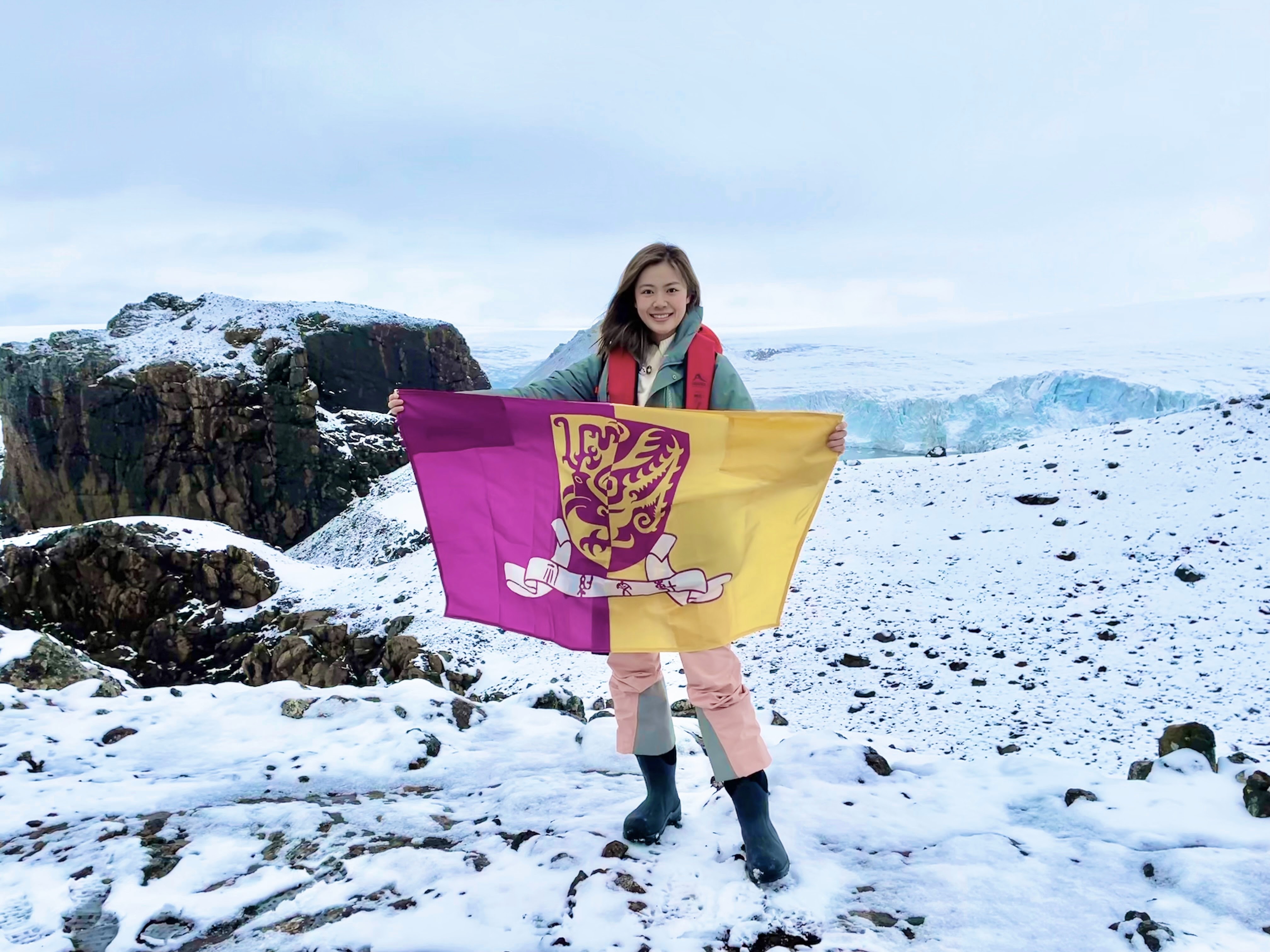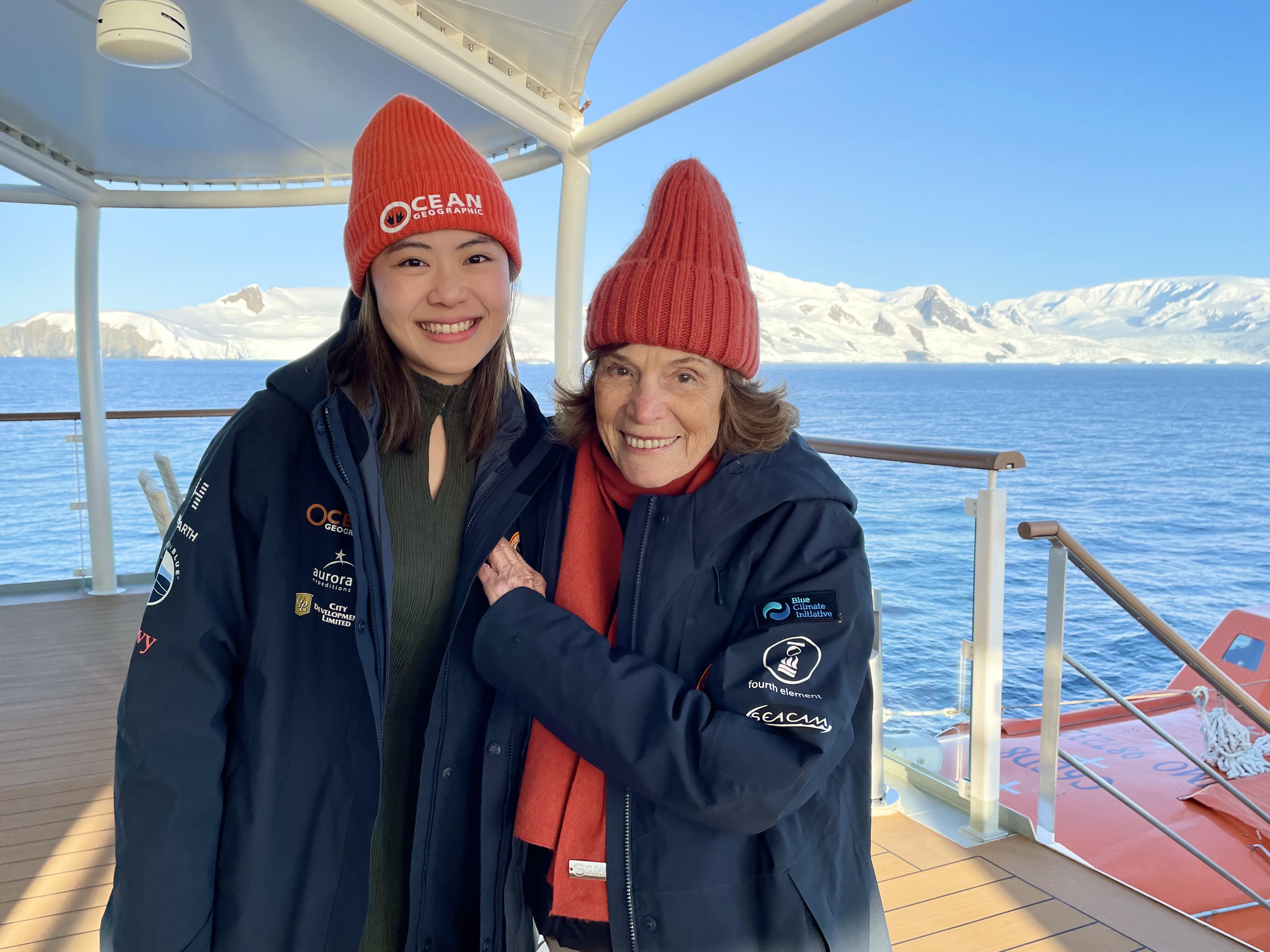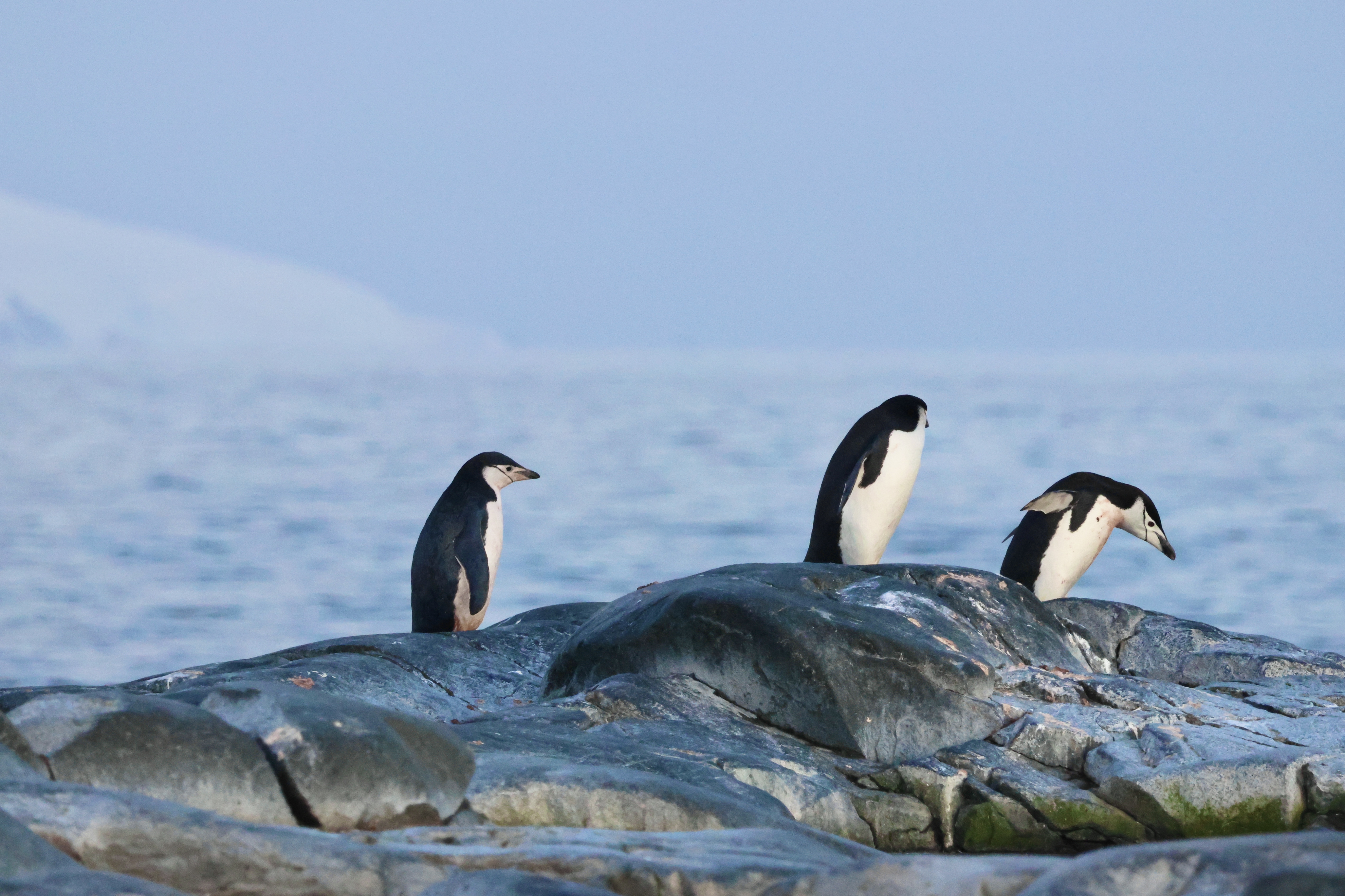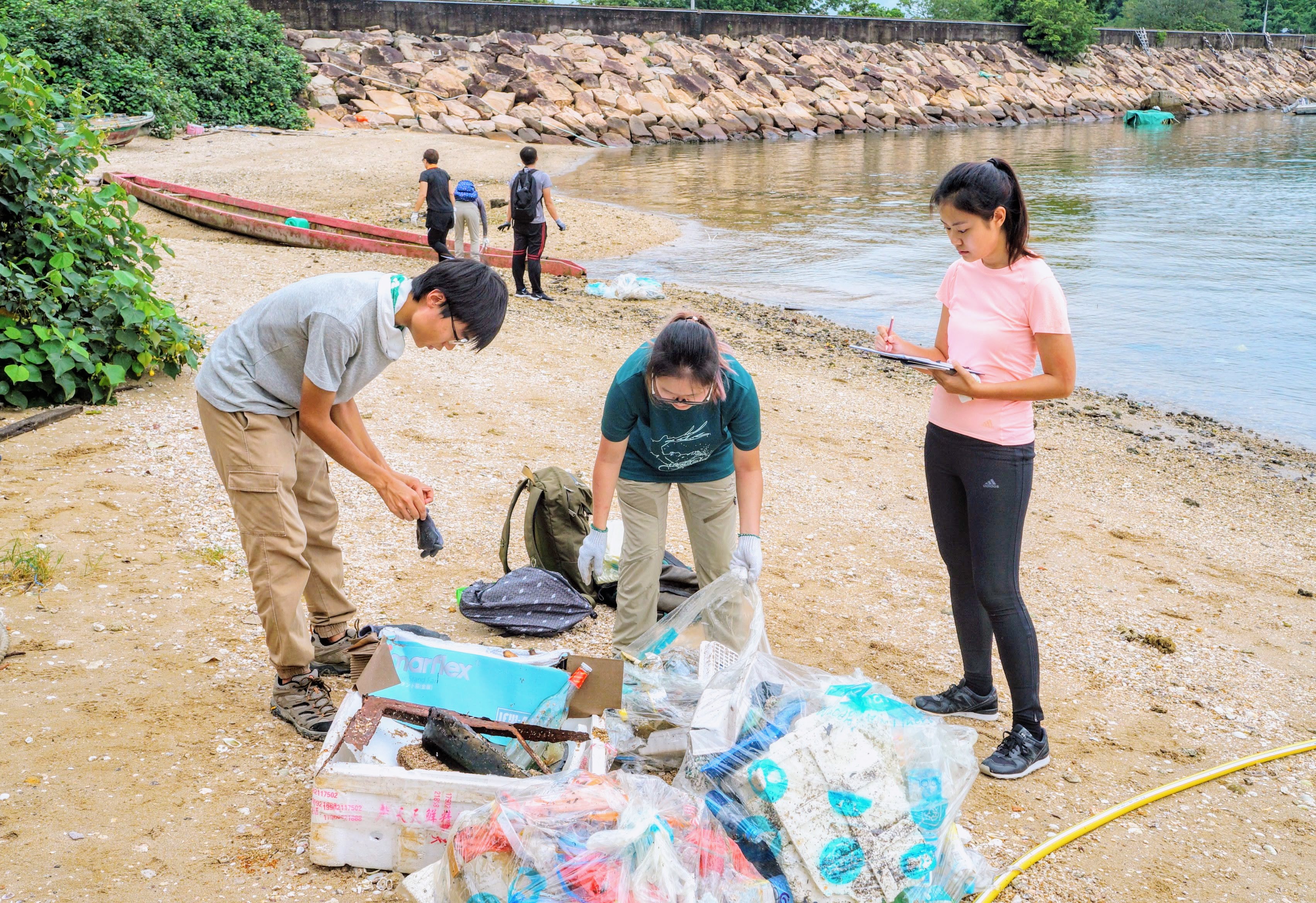Natalie Chung – Climate Advocate Invited on Expedition to the South Pole
Calls for Including the Oceans into Carbon Neutral Vision 2035
When Natalie Chung (19/WYS/Geography and Resource Management) was in Primary Five, she had the opportunity to interview renowned explorer, Dr. Rebecca Lee Lok-sze. The occasion had sparked her lifelong aspiration to combat the climate crisis. After graduating from CUHK, Natalie received the prestigious Esther Yewpick Lee Millennium Scholarship to pursue her MPhil in Environmental Change and Management at Oxford University, and represented Hong Kong at the United Nations Climate Change Conference (COP 25) in Madrid, Spain. Her solid track record has earned her a well-deserved invitation to take part in filming the world's first documentary on climate expeditions at the South Pole in February 2023, where she witnessed many unforgettable images with her own eyes. Upon returning to Hong Kong, Natalie has been proactively campaigning for the urgency of the ocean climate crisis, and encouraging the public to change small habits for a great impact in mitigating climate change.
 Natalie proudly waves the CUHK emblem during the South Pole climate expedition in February 2023.
Natalie proudly waves the CUHK emblem during the South Pole climate expedition in February 2023.
Shocking Scenes of a Collapsing Iceberg
The 14-day Antarctic expedition was led by distinguished marine biologist, Dr. Sylvia Earle. With over 110 crew members from different countries and backgrounds, like scientists, government officials, and indigenous people among others, Natalie was the sole representative from Hong Kong and one of the very few members below the age of 30. Since Antarctica holds 70% of the world's fresh water and the majority of icecaps while boasting a rich biodiversity, Natalie points out that marine life research at the South Pole provides a glimpse of the impact that global climate change has had on the oceans. “The crew is dedicated to exploring innovative solutions to safeguard the oceans and the climate and to unleash the potential of the ocean in accelerating carbon neutrality by 2035. This is an ambitious goal, as many countries are targeting for 2050. By combining the ‘blue power’, or the ocean's potential in absorbing carbon emission, with our best efforts, it will hopefully create a ripple effect and drive carbon neutrality sooner.”
The expedition collected 10 water samples from the surface of the Antarctic Ocean for analysis, and initial results show traces of microplastics in all samples. They also conducted an investigation into the behaviour of whales under environmental changes.
Natalie's first visit to the polar regions has imprinted memorable experiences in her mind. “The most shocking scene was witnessing the collapse of an iceberg, which generated a loud bang that is similar to an explosion, as well as a massive wave like a mini tsunami. Throughout my journey, I only encountered three penguin species, which is less than expected. The chicks are threatened by the increasingly frequent windstorms. While I imagined the South Pole being fully covered in white snow, in reality, global warming has caused it to be blanketed in a layer of green snow algae. This restricts the snow's ability to reflect sunlight, in turn worsening global warming. It has become a vicious cycle.”
 The South Pole climate expedition was led by 88-year-old Dr. Sylvia Earle (right), whose spirit of exploration makes her a role model for Natalie.
The South Pole climate expedition was led by 88-year-old Dr. Sylvia Earle (right), whose spirit of exploration makes her a role model for Natalie.
Reduce the Use of Microplastics and Leave the Krill for Penguins
After the expedition, Natalie has spoken at schools and organizations to share her first-hand experience. “The public may not be able to make the connection between the Antarctic ecology and the global climate crisis. If all ice shelves at the South Pole melted, the global sea level would rise by 60 to 70 metres, causing many countries to be submerged under water. To educate the public about the linkage between the South Pole with climate and ocean conservation, I am planning a multimedia exhibition to be held at the Jockey Club Museum of Climate Change at CUHK.” When it comes to protecting the oceans, Natalie says every small action counts. “Please reduce the use of products with microplastics. Purchase less clothing with synthetic fibre which releases microplastics when washed, and screen out these tiny particles by adding a filter to the washing machine. Hong Kong people love eating seafood, so please consider those being caught or farmed in accordance with sustainable development principles. Finally, krill is the main source of food for animals in the South Pole, including penguins. With a dramatically shrinking krill population due to overfishing and rising sea temperature, we should stop buying by-products of krill.”
 Climate change affects the ecology of penguins, making it harder for their chicks to survive.
Climate change affects the ecology of penguins, making it harder for their chicks to survive.
Supporting the Go Green Spirit of Wu Yee Sun College
Natalie completed her secondary education at a prominent school with distinctive results. While her teachers suggested her to study law or medicine, she remained committed to her childhood aspiration in geography. “The CUHK Geography and Resource Management programme covers a wide spectrum of domains. I recall vividly the excursions to the Wetland Park or even under footbridges, which stimulated my thirst for knowledge and built a proper framework for conducting social science research. Furthermore, the ‘Go Green! Be Sunny!’ spirit of the Wu Yee Sun College is a perfect match with my environmental protectionist mindset. The College also set up the Creativity Lab (c!ab), which is the first facility of its kind at CUHK aiming at fostering student creativity.”
Even in her first year at university, Natalie has partnered with friends to start up V'air Hong Kong, a social enterprise, with a mission in promoting environmental education and the city's rich tourism resources. “We have organized over 300 climate education projects and published two green travel guides. Looking ahead, we will continue to explore local ecotourism opportunities. By encouraging the rural community's participation, we hope to vitalise the rural economy and push for sustainable development. As environmental issues transcend geographical boundaries, there is synergy in Hong Kong's close relationship with the Greater Bay Area and Shenzhen's recent establishment of the world's first mangrove centre. V'air plans to collaborate with other environmental organizations in the Greater Bay Area thus to protect the ecosystem with a concerted effort.”
 After graduating from CUHK, Natalie received a scholarship to pursue her MPhil in Environmental Change and Management at Oxford University.
After graduating from CUHK, Natalie received a scholarship to pursue her MPhil in Environmental Change and Management at Oxford University.
 V'air promotes local ecotourism and organizes activities to help clean up marine litter.
V'air promotes local ecotourism and organizes activities to help clean up marine litter.
"CU Alumni Magazine" Video Interview: https://youtu.be/6ya7zESRpx0 (Chinese only)
Published in "CU Alumni Magazine" Issue 114 by Alumni Affairs Office 2023
Read online: CU Alumni Magazine Issue No. 114 (Chinese Version Only)
pdf version: http://alumni.cuhk.edu.hk/zh-Hant/magazine/categories/pdfversion/202306
ISSUU version: http://www.alumni.cuhk.edu.hk/magazine/issuu/





